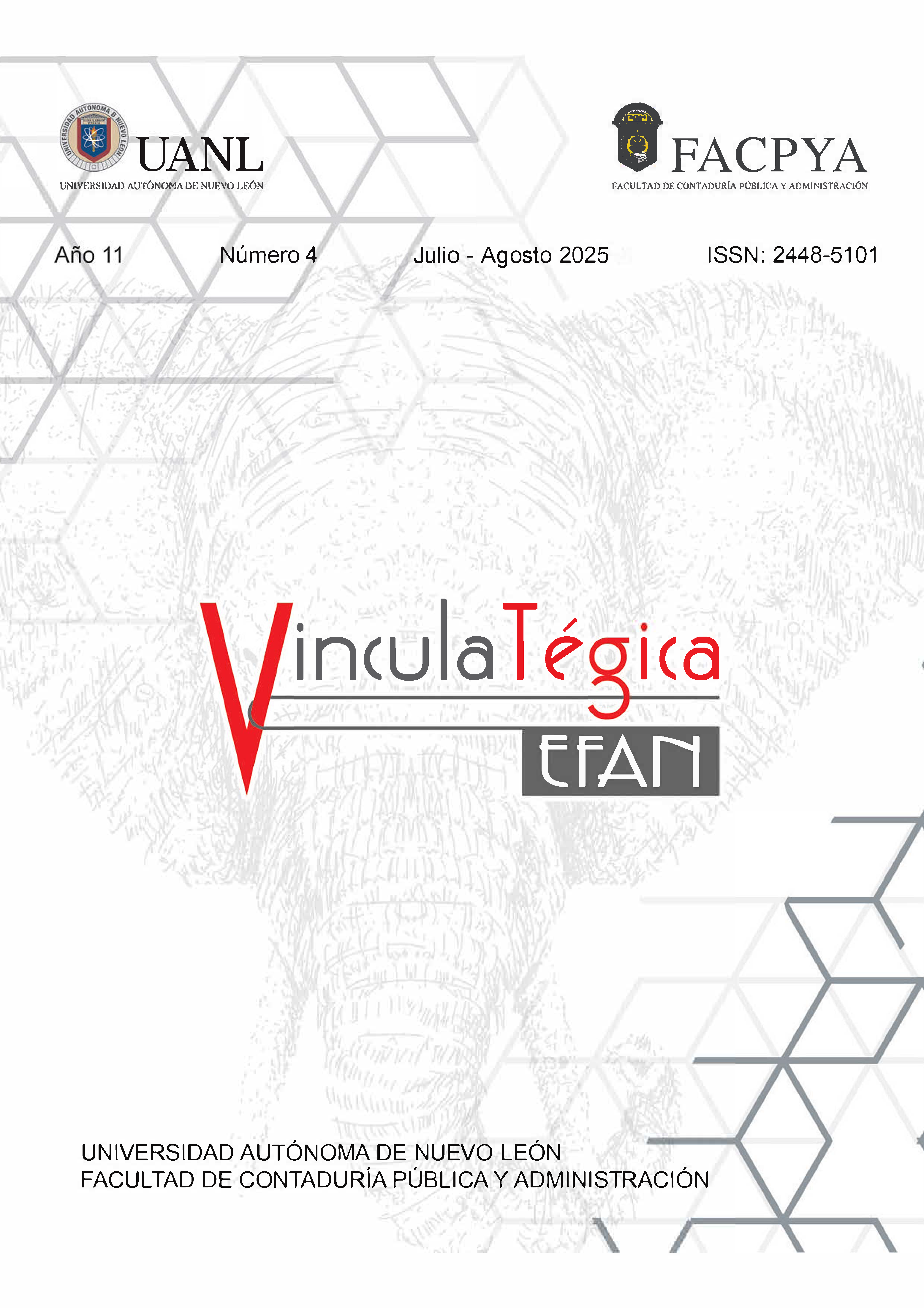Comparison of Trade Policy Formulation Processes: the United States, the European Union and the United Kingdom.
DOI:
https://doi.org/10.29105/vtga11.4-1145Keywords:
Trade policy, United States, European Union, United Kingdom, free trade agreements.Abstract
By resorting to the social choice theory, and by means of the comparative method based on the analysis of 9 variables, the processes of trade policy formulation of three economic powers are studied in this paper: the United States, the European Union, and the United Kingdom in its post-Brexit stage
Downloads
References
Altbach, Eric. (1997) “US Foreign Economy Policy. Who is in Charge? JEI Report, no. 40, 24 octubre, http://www.jei.org/Archive/JEIR97/9740f.html#development
Arrow, Kenneth. (1991) “Valores Individuales y Valores Sociales” en Joseph Colomer, Lecturas de Teoría Política Positiva, Instituto de Estudios Fiscales, Madrid, España, pp. 491-513.
Ayala Espino, José, (2000) Mercado, Elección Social e Instituciones. Una Revisión de las Teorías Modernas del Estado, Editorial Miguel Angel Porrúa-Facultad de Economía de la UNAM, segunda edición, julio, pp. 50-52.
Barrie Robert W. (1987), Congress and the Executive: The Making of the United States Foreign Trade Policy, 1789-1968, Garland Publishing Inc. Nueva York EU, pp. 64-70.
Delgadillo, D. S., & Salinas, J. C. (2021). En búsqueda de un equilibrio elusivo: un análisis comparativo de la elección social y la elección pública. Espiral, 28(82), pp. 41–74. https://doi.org/10.32870/EEES.V28I82.7217 DOI: https://doi.org/10.32870/eees.v28i82.7217
Eckes, Alfred E. Jr. (1999) “U.S. Trade History”, en William A. Lovett, et. al. U.S. Trade Policy. History, Theory and the WTO, editorial E.M. Sharpe, Armonk New York, pp. 61-62.
Gstohl, S., & de Bievre, D. (2017). The trade policy of the European union (1st ed.). Red Globe Press.
I. M. Destler, American Trade Politics. Third Edition. Institute for International Economics, 1995.
Hiscox, Michael J. (1999) “The Magic Bullet? The RTAA, Institutional Reform, and Trade Liberalization”. En International Organization, vol. 53, no. 4 otoño. DOI: https://doi.org/10.1162/002081899551039
Hobolt, S. B. (2016). The Brexit vote: a divided nation, a divided continent. Journal Of European Public Policy, 23(9), 1259-1277. https://doi.org/10.1080/13501763.2016.1225785 DOI: https://doi.org/10.1080/13501763.2016.1225785
Hopmann, Terrence, (1998). The Negotiation Process and the Resolution of International Conflicts, University of South Carolina Press, EU, 1998.
Keohane, Robert O (1993). Instituciones Internacionales y Poder Estatal, grupo Editor Latinoamericano, Buenos Aires, Argentina.
Massó, Jordi. (1996) “La Teoría de la Elección Social: Métodos de Notación No Manipulables”, Departamento de Economía e Historia Económica y CODE, Universitat Autónoma de Barcelona. http://hotelling.uab.es/~JMasso/SBOLETIN.PDF,
Mattoo, A., Rocha, N., y Ruta, M. (2020). The evolution of deep trade agreements. The World Bank, https://doi.org/10.1596/1813-9450-9283 DOI: https://doi.org/10.1596/978-1-4648-1539-3
Meunier, Sophie. (2021). Trading voices: The European union in international commercial negotiations. Princeton University Press. https://doi.org/10.2307/j.ctv18gfzhh DOI: https://doi.org/10.2307/j.ctv18gfzhh
Meunier, S., y Nicolaïdis, K. (2006). The European Union as a conflicted trade power. Journal Of European Public Policy, 13(6), 906-925. https://doi.org/10.1080/13501760600838623 DOI: https://doi.org/10.1080/13501760600838623
Morris, Henry. (2024) Where do the UK's trade negotiations stand now?, Deloitte. https://taxscape.deloitte.com/article/where-do-the-uk-s-trade-negotiations-stand-now-.aspx
Moseley, T. (2017). Theresa May on Brexit: Then and now. BBC News. https://www.bbc.com/news/uk-politics-38653681
North, Douglas. (1995). Instituciones, Cambio Institucional y Desempeño Económico, Fondo de Cultura Económica, México.
Odell, John (2000) Negotiating the World Economy, Cornell University Press, Ithaca, Nueva York, EU, 2000.
Sen, A. (1977). Social choice theory: A re-examination. Econometrica: Journal of the Econometric Society, 45(1), 53. https://doi.org/10.2307/1913287 DOI: https://doi.org/10.2307/1913287
Schnietz, Karen E. (2000). “The Institutional Foundation of the U.S. Trade Policy: Revisiting Explanations for the 1934 Reciprocal Trade Agreements Act”. Journal of Policy History, vol 12, no. 4. DOI: https://doi.org/10.1353/jph.2000.0032
Siles-Brugge, G. (2014). Constructing European union trade policy: A global idea of Europe (2014th ed.). Palgrave Macmillan. DOI: https://doi.org/10.1057/9781137331663
Taheny, Sean (2023) New UK trade agreements – an introduction. SPICe Spotlight | Solas Air SPICe. https://spice-spotlight.scot/2023/02/02/new-uk-trade-agreements-an-introduction/
Thomas. (2024). Beyond GDP per Capita: Comparing the US, UK, and EU economic and social systems. NordicHQ. https://www.nordichq.com/beyond-gdp-per-capita-comparing-the-us-uk-and-eu-economic-and-social-systems/
Towfigh, Emanuel V. y etersen, Niels P (2017), Public and social choice theory, en Towfigh, E. V., & Petersen, N. Economic methods for lawyers. Edward Elgar Publishing.
Verity, Leo (2023). UK trade policy - why good scrutiny matters. Trade Justice Movement; https://www.tjm.org.uk/resources/briefings/uk-trade-policy-why-good-scrutiny-matters
Zartman, William (1977). "Negotiation as a Joint Decision-Making Process", en Journal of Conflict Resolution, Vol. 21 No. 4. December 1977 Sage Publications, pp. 16-21. DOI: https://doi.org/10.1177/002200277702100405
Woolcock, Stephen (2007). European union policy towards Free Trade agreements. Econstor. Eu. Consultadp el 24 de febrero, 2025, en https://www.econstor.eu/bitstream/10419/174818/1/ecipe-wp-2007-03.pdf
Woolcock, S. (2011). EU trade policy and the treaty of Lisbon. In The European Union in International Fora (pp. 85–98). Nomos. DOI: https://doi.org/10.5771/9783845233024-85
Downloads
Published
How to Cite
Issue
Section
License
Copyright (c) 2025 Raul Gustavo Acua Popocatl, Selene Jiménez Bautista, Rodolfo Téllez-Cuevas

This work is licensed under a Creative Commons Attribution 4.0 International License.
a). Authors keep copyright and give the journal the right of the first publication of the work under a Creative Commons attribution license. This license allows others to share the work as long as original authorship and initial publication in this journal is acknowledged.
b). Authors may make other independent and additional contractual agreements for the non-exclusive distribution of the version of the article published in this journal (e.g., include it in an institutional repository or publish it in a book) as long as they clearly indicate that the work was published for the first time in this journal.







